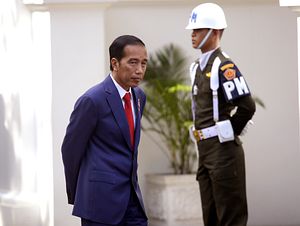Last week’s cabinet reshuffle in Indonesia follows months of speculation and is President Joko “Jokowi” Widodo’s third, and likely final, of this term. With the president set to officially hit the campaign trail later this year ahead of the April 2019 election, this reshuffle has widely been viewed as essentially minor yet very telling.
The reshuffle back in July 2016 was aimed at clearing the cabinet of dead weight, specifically former Coordinating Minister for Maritime Affairs Rizal Ramli, who was dumped after a string of controversies, and former Finance Minister Bambang Brodjonegoro. Brodjonegoro was replaced by Sri Mulyani Indrawati, whose enormous popularity saw the reshuffle immediately deemed a success and sprouted rumors that the new finance minister was a potential option for vice president for Jokowi’s second term.
This time around, the replacement of presidential chief of staff Teten Masduki, who took up the post in 2015 after Luhut Binsar Pandjaitan became coordinating minister for maritime affairs, with retired military (TNI) commander Moeldoko seems a savvy move. Moeldoko retired from his TNI post in 2015 with the intention of launching his own presidential run in 2019, but has settled for the high-profile and powerful role.
Moeldoko joins a small but growing group of former high-ranking military and police personnel within Jokowi’s inner sanctum. Eyebrows raised across Jakarta when retired TNI general Wiranto was named coordinating minister for political, legal and security affairs in the 2016 shuffle. Wiranto oversaw the TNI during 1998 and 1999 and student and human rights activists across the country argued that scrutiny over his role should come alongside broader reconciliation with deaths during the violent post-Suharto period, which allegedly involved military forces. But the move paid off quickly for Jokowi, who was able to deploy Wiranto and broker a somewhat peaceful resolution to the tense Jakarta election demonstrations in 2016 and 2017.
Jokowi may well be hoping lightning will strike twice with the appointment of Moeldoko. As the president’s right hand man, Moeldoko brings with him a long and successful career as a military leader and representative of Indonesia’s security apparatus abroad. Importantly, some have suggested that Moeldoko’s position could offset the influence of Coordinating Minister of Maritime Affairs Luhut Binsar Pandjaitan. Pandjaitan, a former commander in TNI special forces unit Kopassus, has faced heavy criticism for his apparent desire to hold more power within the cabinet than he actually either should have or has.
Shoring up the support of the military is one part of Jokowi’s transparently two-pronged plan for a pre-election cabinet. Joining former military leaders in the cabinet is Idrus Marham, a former Golkar secretary general and now social affairs minister, who replaces Kofifah Parawansa after he announced his intention to run for East Java Governor in the June regional elections.
The addition of Marham gives the Golkar party its fourth spot in the cabinet. Once the most antagonistic of the major House of Representative factions against the Indonesian Democratic Party of Struggle (PDI-P) led government coalition, Golkar has thrown its weight behind the re-election of Jokowi in 2019. Burned by a mammoth corruption case against former chairman Setya Novanto and decreasing support at the polls, the move too is no surprise.
Interestingly, Setya’s replacement as Golkar head, Industry Minister Airlangga Hartarto, was not forced to give up his post in the cabinet after being named party boss last month. Hartarto is the exception to a rule Jokowi announced at the start of his presidency that no cabinet member can lead a political party (Jokowi himself is not the boss of the PDI-P), which saw National Awakening Party (PKB) Chairman Muhaimin Iskander turn down an offer and Wiranto give up his leadership of the Hanura party to join the working cabinet.
With election regulations meaning Jokowi must step back from most major aspects of the presidency in August, this reshuffle is all but guaranteed to be the final iteration. With the polls over a year away and fears over everything from illiberalism to the problematic rolling out of major infrastructure projects, a cabinet reshuffle is among Jokowi’s easier tasks as he heads for re-election next year.

































